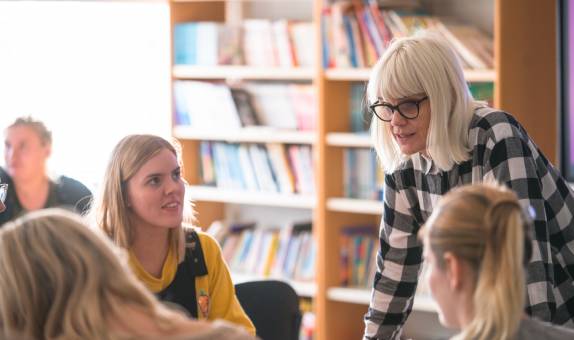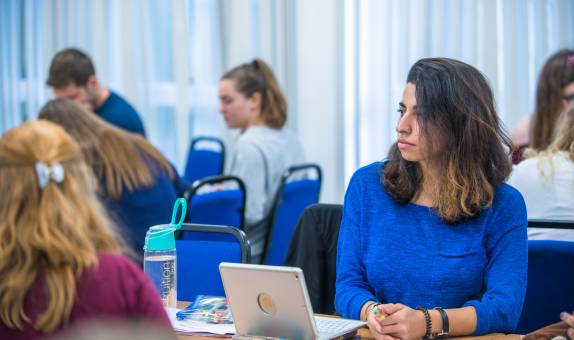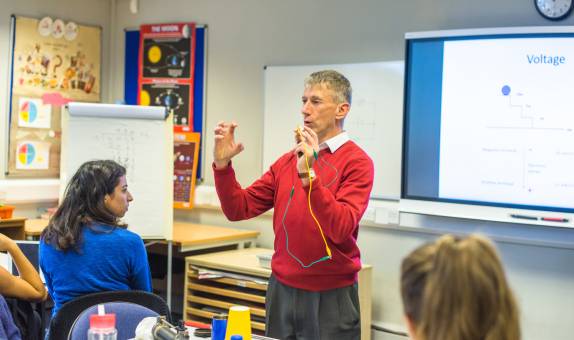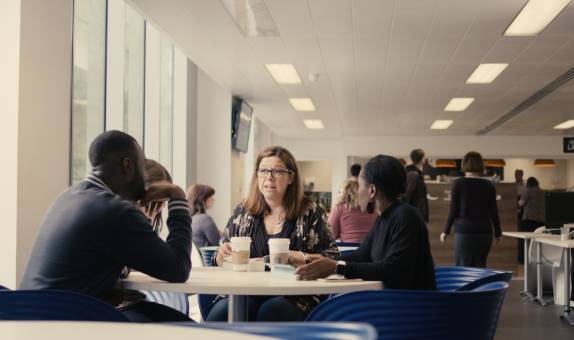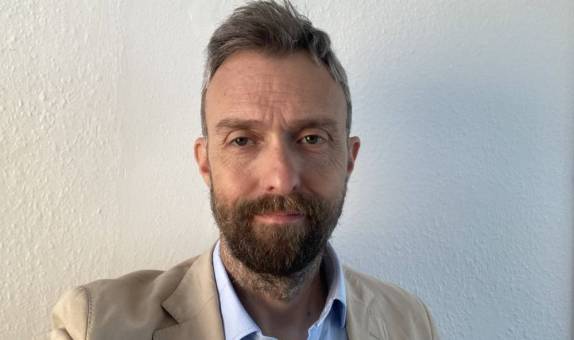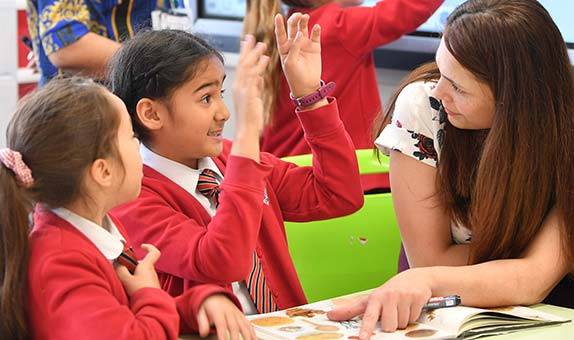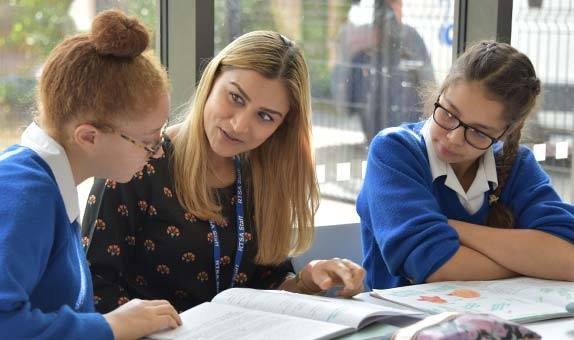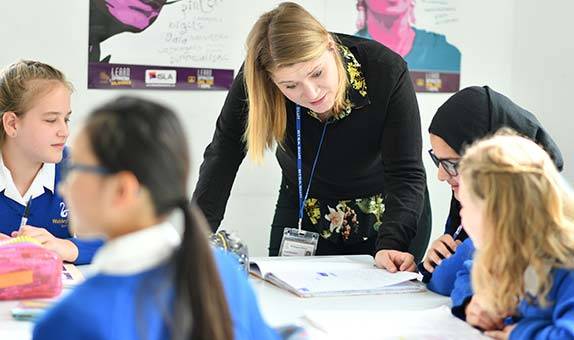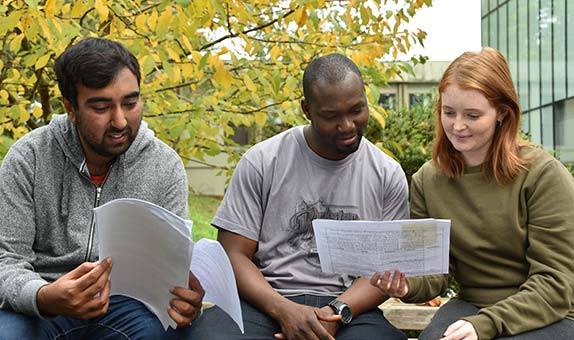Secondary Teaching leading to Qualified Teacher Status (QTS) PGCE: Science (Biology, Chemistry, Physics)
Why choose this course?
Want to make a difference to the lives of young people in the classroom? Train to teach in one year with our PGCE Secondary course.
This course will enable you to become an effective, inclusive and evidence informed teacher.
Why choose this pathway?
Kingston University's PGCE Science courses are an innovative, future-facing teacher training route for those passionate about fostering pupils' enthusiasm and understanding of science. Our vision is to develop critically confident, well-rounded teachers who are values-driven and ready to positively impact the lives of young people in their communities.
Immerse yourself in topics including Genetics and interdependence, Chemical Kinetics and Organic chemistry, Mechanics and Energy, while meeting curriculum requirements for teaching 11-16-year-olds, including GCSEs. Develop your ability to teach topical and complex conceptual issues with confidence, enhanced by visits to the Science and Natural History Museum, and work with organizations like the Association for Science Education (ASE) and the Institute of Biology, Royal Society of Chemistry, and the Institute of Physics. Our Science component prepares you to teach Biology, Physics and Chemistry to 11-16-year-olds, expanding your expertise and boosting your career prospects.
Ready to shape the future of education? If our vision and values resonate with your goals, start your teaching journey with Kingston University.
Bursaries
For 2025 to 2026, the Department for Education is offering bursaries of £29,000 in chemistry and physics, and £26,000 in biology. They are also offering scholarships of £31,000 in chemistry and physics. Visit Funding: initial teacher training (ITT), academic year 2025 to 2026 - gov.uk for details.
| Pathway | UCAS code | Mode | Duration | Start date |
|---|---|---|---|---|
| Biology | C1X1 | Full time | 1 year | September 2025 |
| Chemistry | F1X1 | Full time | 1 year | September 2025 |
| Physics | F3X1 | Full time | 1 year | September 2025 |
Reasons to choose Kingston University
- This intensive, well-supported course prepares you to teach in the 11-16 age range and offers the opportunity to develop teaching for sixth form.
- Kingston's partnership schools offer excellent opportunities for practical learning.
- You will have personalised support from both University and partnership schools.
What you will study
Ambitious Curriculum: Our curriculum fully integrates the ITT Core Content Framework (CCF) in line with DfE requirements, sequencing theory and practice to support your development throughout the year. It includes innovations like AI integration to enhance your planning and teaching. Intensive Training and Practice elements focused on behaviour management, inclusive practice, and questioning, prepare you for the next stage in your professional development as an Early Career Teacher (ECT).
Expert Guidance: Learn from research-engaged subject-specialists who employ evidence-based teaching approaches. Through critical analysis of theory and research, and observation of expert practice, you'll gain a deep understanding of your subject and the practical pedagogical skills needed for teaching.
Strong Support: Benefit from strong school partnerships, high-quality pastoral support and mentor training, all aimed at ensuring your success in achieving Qualified Teacher Status (QTS). Our commitment to staff and student wellbeing provides a solid foundation for a career in teaching and working with children and young people.
Future-facing, Real-World Application: The Professional Practice module is central to our PGCE and allows you to apply university learning to your classroom experience, emphasizing skills of empathy, adaptability, creativity, collaboration, and digital competency—essential elements for effective teaching practice now and for your future career.
In addition to gaining Qualified Teacher Status (QTS) in accordance with government standards, you will also receive the award of PGCE with 60 credits towards our Master of Education (MA), which you can continue with beyond your PGCE year.
Modules
Core modules
Professional Practice
0 credits
Non-credit bearing module
This module focuses on developing your ability to teach, assess and undertake your professional responsibilities in your chosen phase of education. It is part based at the University, where lectures, seminars and online learning will provide you with research, theory and practice based insights into effective learning and teaching. It is largely based upon your practice in school and settings, where you receive formal training, experience of working alongside professionals, experience of being the lead practitioner in a classroom/setting and experience of the wider aspects of being a teacher.
The Reflective Teacher
30 credits
This module introduces you to theories of reflective practice and the value and purpose of reflection for teachers. This will enable you to develop in-depth understanding of how you reflect in order to identify issues and develop solutions in your professional settings.
The main features of the module are critical explorations of factors that affect how children develop physically, socially and as learners. You will critically analyse issues relevant to your current practice, considering your own position as an effective teacher.
Through completion of a reflective journal during the module, you will develop critical, reflective and reflexive skills to inform peer and colleague discussion within a learning community. You will be encouraged and supported to challenge and develop your professional practice.
Perspectives on policy, practice and professionalism for teachers
30 credits
This module enables you to locate yourself as an emerging professional within wider discourses about teaching as a profession. It allows you to evaluate your own identity as a professional and reflect on the values that you and the wider profession hold. You will critically analyse discussions and debates which affect classroom practice. These debates will focus on specific areas to exemplify wider issues in education. The focus of these discussions will be on inclusive teaching and learning and the legislative frameworks which provide codes of practice.
A key focus of the module is to develop your ability to make sense of education research and to apply this in the context of your school or setting.
Classroom experience
The course has been designed to allow trainees to spend 120 days in school, ensuring that you start your teaching career with confidence. A school-based professional mentor and tutors from the University will support you during your placements.
You will benefit from two contrasting placements in our committed partnership of schools. You'll also benefit from a course that supports you in becoming a research–engaged teacher, who can use evidence to drive improvements in young people's learning and wellbeing.
Whilst on placement, students are expected to carry out the normal school hours and engage in school life such as attending early morning/evening meetings, which will vary depending on the school.
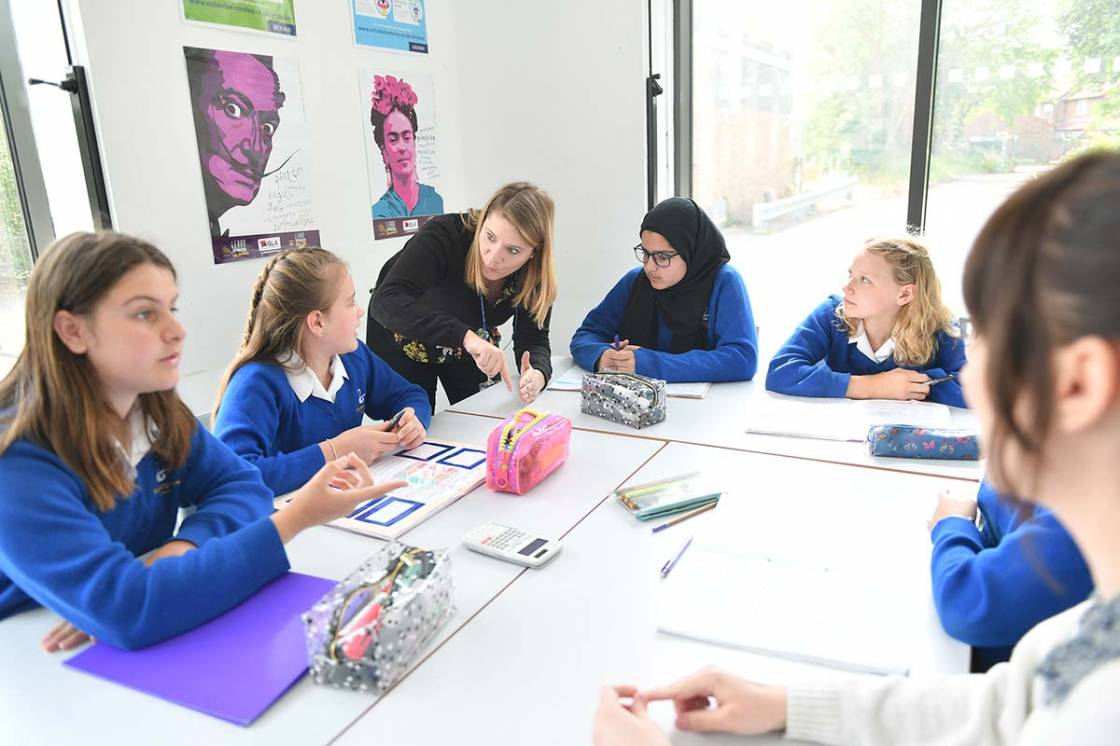
Entry requirements
Previous overseas teaching qualifications and experience
If you are a teacher or have teaching experience outside the UK, please view the different Routes to qualified teacher status (QTS) for teachers and those with teaching experience outside the UK - gov.uk.
If you are applying with an existing overseas teaching qualification you may already be eligible to apply directly for Qualified Teacher Status (QTS) from the government.
If you do not meet the government requirements for QTS and have UK teaching experience, you may be able to apply to our Assessment Only route leading to Qualified Teacher Status.
Teaching and assessment
Your taught sessions will be a mix of seminars, lectures, practical workshops, field trips and work with pupils. Peer-led critical support groups will also feature in the programme. Most of your sessions will be taught by University tutors but there may also be guest speakers, such as headteachers or subject leaders.
Why choose Kingston's Department of Education
Who teaches this course?
The tutors for your course have experience teaching in schools. They continue to be actively involved in a range of education related activities, such as further study, research and direct work with schools and in educational settings.
Current research in this subject
Many of our staff in the Department of Education are research active. This ensures they are in touch with the latest thinking and bring best practice to your studies.
Education research at Kingston focuses on:
- Subject pedagogy
- Curriculum design
- Planning
- Assessment
- Safeguarding
- SEND and inclusive practice
- Early Years
- Supporting more able learners
- Educational inequalities
- Policy
- History of education
Fees for this course
Additional costs
Depending on the programme of study, there may be extra costs that are not covered by tuition fees which students will need to consider when planning their studies. Tuition fees cover the cost of your teaching, assessment and operating University facilities such as the library, access to shared IT equipment and other support services. Accommodation and living costs are not included in our fees.
Where a course has additional expenses, we make every effort to highlight them. These may include optional field trips, materials (for example, art, design, engineering), security checks such as DBS, uniforms, specialist clothing or professional memberships.
Kingston Hill
There is a wide range of facilities at our Kingston Hill campus, where this course is based.
Kingston Hill is a leafy, hillside campus situated about three miles away from Kingston town centre. It is a quiet, secure place to study with easy access to London, meaning it provides the best of all worlds for our students.
Find out more about the Kingston Hill campus in the virtual tour.
Library
One of the highlights of the Kingston Hill campus is the modern library, called the Nightingale Centre after Florence Nightingale, who was a regular visitor to Kingston Hill.
The library provides a spacious and attractive place for students to meet and study and features a cafe, more PCs and zoned study areas. Long opening hours give you plenty of access to specialist education books, journals and online resources.
Find out more about the Nightingale Centre in the virtual tour.
Computer and online facilities
There are many computers (PCs and Macs) available for you to use across the Kingston Hill campus when you need a place to study. Access to the wireless network across the campus means you can also work from your laptop or mobile device.
Using IT to support your studies is crucial. Kingston has an innovative virtual learning environment called Canvas. This allows you to access course materials and contact fellow students and staff while away from the campus.
Facilities
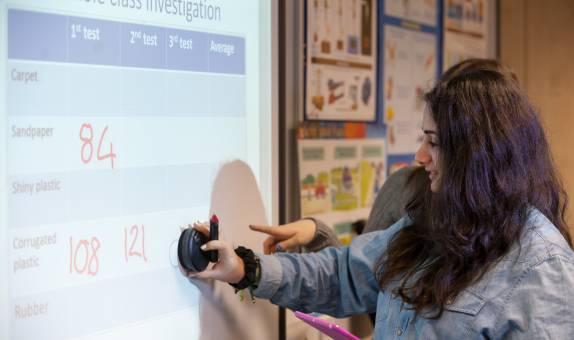
The latest in classroom technology

While you are studying to become a teacher here at Kingston University much of your time will be spent putting your skills into practice within a school environment. The rest of the time will be spent being taught by highly experienced professionals. The School of Education prides itself on providing the latest in classroom technology to ensure that you embark on your work experience in schools with the utmost confidence, and to give you a head start in your first teaching post.
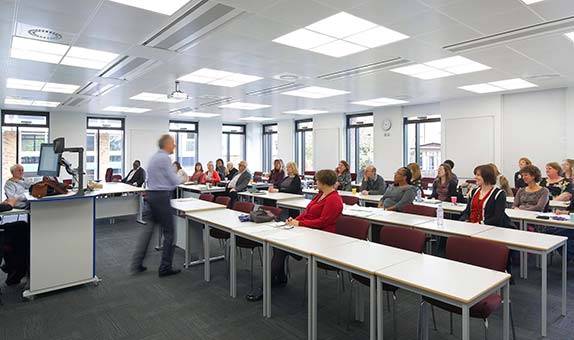
Virtual teaching rooms

Within Kingston University, we have a number of teaching rooms set up to replicate actual classrooms. Each classroom is subject based - there is an art room, science lab, etc - and is equipped with all the relevant facilities you will need to practise your lessons before taking them into school.
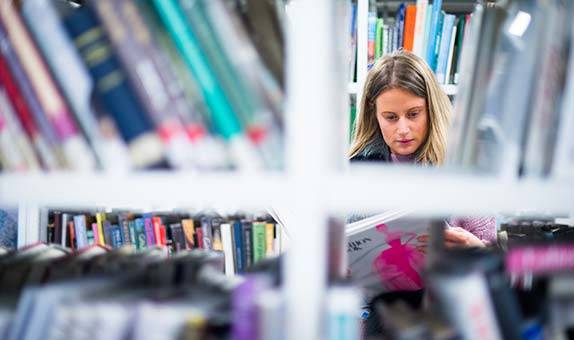
Library resources

All our education students have access to the libraries and IT resources at Kingston University.
Our library (the Nightingale Centre) has every teaching resource you could think of to help you plan your lessons, as well as a dedicated librarian to help you find what you're looking for. The range of educational resources available also aims to reflect current educational thinking and are used in local schools. They cover material from early learning through to A-level.
From picture books with corresponding DVDs/ videos, CDs and even puppets, to children's novels for all ability levels, and from poetry and plays to fairy tales, the Nightingale Centre has no end of imaginative literature to help you bring your classes to life. Also available are the journals Books for Keeps and Carousel, which provide the latest reviews on appropriate resources for young infants and teenagers, offering you added inspiration.
The Nightingale Centre offers more than just books to help you in your studies and lesson plans. You'll have access to a range of children's music and nursery rhymes on CD, as well as artefacts and kits that can be used to illustrate historical periods, different religions, science, maths and music. We also have puppets and story sacks, which contain a picture book, nonfiction book, soft toy or puppet and a game or other associated materials, as well as posters, CD-ROMs and DVDs/videos.
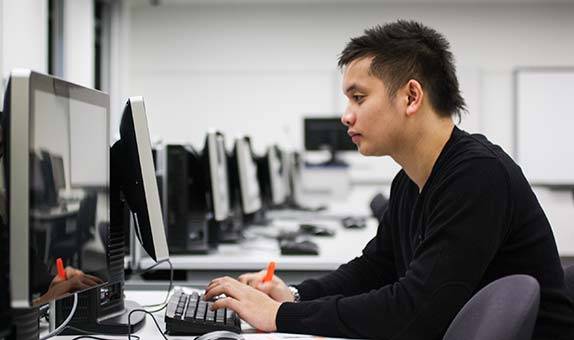
Further resources

Further resources are available including:
- Classroom resources by subject - which link to organisations for teachers, and to websites for teachers and children; and
- Thousands of quality photographic images from the Getty archive (Education Image Gallery), which you can use to create classroom resources.
Links with business and industry
We have links with:
- A strong partnership of schools and settings in which you'll train
- Special schools
- Teaching school alliances
- Multi-academy trusts
- Schools and settings-centred Initial Teacher Training providers
- Local authorities
- Teaching unions
- Other universities around the country to share good practice
After you graduate
The course also aims to develop your professional skills to help you gain employment in a secondary school and continue with your professional development. It will provide you with a rigorous training in all aspects of being a secondary school teacher. Over 95% of our graduates enter the teaching profession after they complete their course. Many go into middle and senior management roles in schools.
Changes to courses for 2021/22 due to Covid-19
Course changes and regulations
The information on this page reflects the currently intended course structure and module details. To improve your student experience and the quality of your degree, we may review and change the material information of this course. Course changes explained.
Programme Specifications for the course are published ahead of each academic year.
Regulations governing this course can be found on our website.



